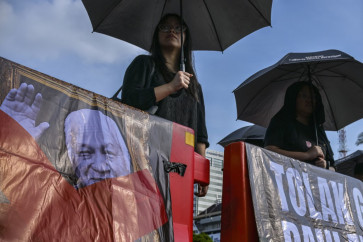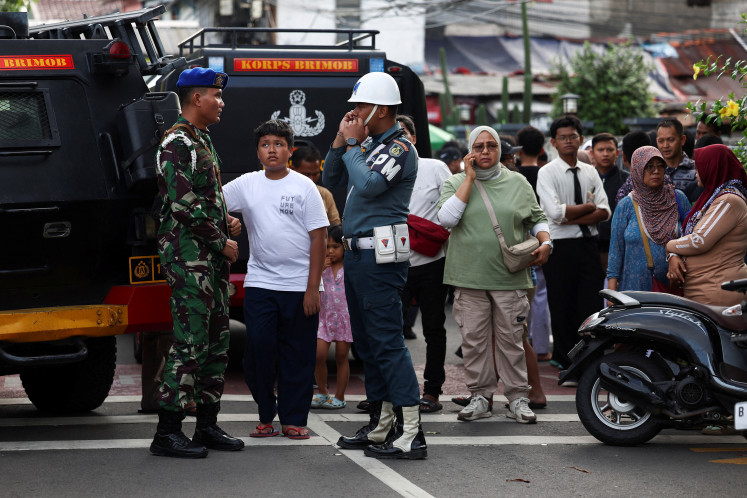Popular Reads
Top Results
Can't find what you're looking for?
View all search resultsPopular Reads
Top Results
Can't find what you're looking for?
View all search resultsBringing Indonesian domestic workers out of legal limbo
Latifah was 14 years old when she dropped out of school and started working as a nanny in West Java — but, like many Indonesian domestic workers, she found herself trapped in an abusive environment with minimal legal protection
Change text size
Gift Premium Articles
to Anyone
L
atifah was 14 years old when she dropped out of school and started working as a nanny in West Java — but, like many Indonesian domestic workers, she found herself trapped in an abusive environment with minimal legal protection.
Her male employer not only sexually harassed her, but also kept her from communicating with the outside world. He would expose himself to her when his wife was not around, forbid her from using a mobile phone, and sometimes enter her room at night when she was sleeping.
“I woke up and felt afraid. I didn’t tell his wife about the situation as I was afraid she would not believe me. Finally, I took a phone from one of the family’s older children and called the recruitment agency. I asked them to take us back … I didn’t want to work for this employer any longer.”
On Feb. 15 Indonesia marks its National Day for Domestic Workers — it is not a day many will have heard of, but that does not make it any less important. Latifah’s case is emblematic of the unacceptable daily reality too many women and girl domestic workers are facing.
There are more than 52 million domestic workers across the world today — in Asia alone there are more than 21 million, the highest of any region. These include anyone working behind the doors of a household — like nannies or cleaners.
Many of these women and men face the same hardships — poor working conditions, pitiful salaries and a lack of legal protection that leaves them at the mercy of employers.
While we often hear stories about the cruel treatment faced by Indonesian migrant domestic workers in countries like Malaysia, Singapore or Saudi Arabia, very little is often reported about the situation in
Indonesia.
Domestic workers are still not legally recognized as workers here, leaving them in legal limbo without the same protections and safeguards as the rest of the labor force. In 2010 there were an estimated 2.4 million domestic workers in the country, of whom 1.8 million were women. In the absence of a comprehensive survey, it is likely that this figure is now much higher.
Since 2006, Amnesty International has been campaigning for Indonesian domestic workers to be afforded the same legal protection as other workers. We have been urging the Indonesian legislature to revise the 2003 Manpower Law, or to urgently pass a law giving adequate legal protection to domestic workers. Unfortunately, little progress has been made.
Many women and girl domestic workers still work in desperately poor conditions, where the lack of legal protection translates into extremely long working hours without any time for proper rest.
Domestic workers in Indonesia can work up to 12 hours per day, seven days per week. Holidays, or even a weekly day off, that we take for granted are unheard of for some domestic workers.
But this is not just an issue of workers’ rights; it is also one of gender equality. The vast majority of domestic workers in Indonesia are women, some of them girls under the age of 18. Many are victims of gender-based violence like rape or sexual harassment, but they do not report these crimes — either because they are not aware that they legally can, or out of fear of losing their jobs.
Being forced to work from an early age to help support their families also means that many women and girl domestic workers leave school early. This does not just hamper their future education and employment prospects, but also leaves them even less aware of their basic rights.
A domestic workers protection law has been prioritized on the legislative agenda in Indonesia since 2010, but has yet to be enacted. The failure to pass this law has already been raised twice at the United Nations in 2012.
While there have been some positive steps towards making the law reality over the past year — such as initial discussions with civil society, and a legislative working group set up to debate the issue — we urge the legislature to make the issue a priority for 2013 and take real action toward enacting and implementing it.
There are real concerns that the draft may fall short of international law and standards. Over the past year, domestic workers activists have called on the legislature to ensure that the bill includes adequate provisions relating to hours of work, wages and dispute resolution mechanisms, among other things.
The bill must also include provisions accounting for the specific needs of women — such as ensuring sexual and reproductive rights for domestic workers, in particular during and after pregnancy. The legislature must ensure that any final draft is not half-hearted, but genuinely meets international human rights standards.
The Indonesian government should also ratify and implement the International Labor Organization (ILO) Domestic Workers Convention, which enters in to force in September this year and sets an international standard for improving the condition for the world’s tens of millions of domestic workers.
President Susilo Bambang Yudhoyono has already expressed his support for the convention in speeches — but as long as the government does not follow up with action, this will continue to look like lip service to a crucial issue as well as undermine efforts to protect the over a million Indonesian domestic workers now employed abroad.
By taking this issue seriously and implementing a law that provides real protection, Indonesia could be leading the way not just for those suffering in their own country, but in the whole wider Southeast Asian region.
Let us make sure that on the next Day for Domestic Workers in 2014, we can look back on some genuinely positive achievements.
The writer is Amnesty International’s deputy Asia-Pacific director.










